Shuyan Dong
Introducing Semantics into Speech Encoders
Nov 15, 2022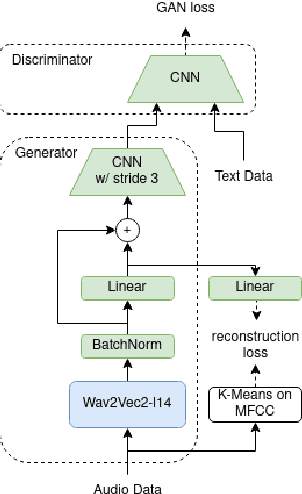
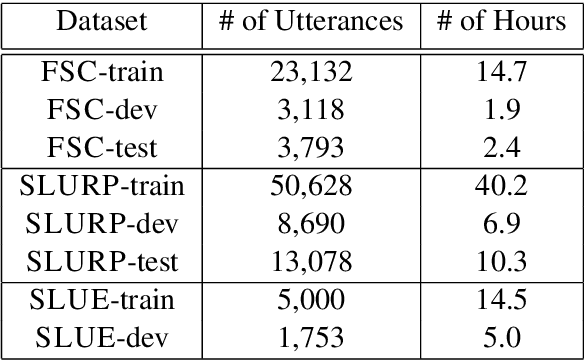
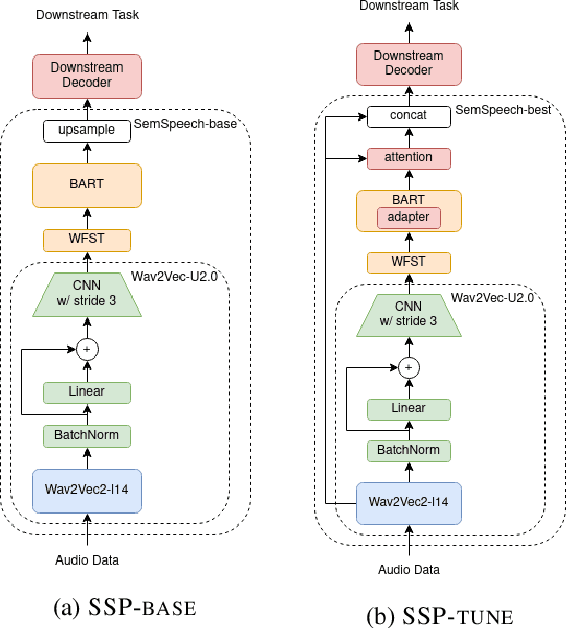

Abstract:Recent studies find existing self-supervised speech encoders contain primarily acoustic rather than semantic information. As a result, pipelined supervised automatic speech recognition (ASR) to large language model (LLM) systems achieve state-of-the-art results on semantic spoken language tasks by utilizing rich semantic representations from the LLM. These systems come at the cost of labeled audio transcriptions, which is expensive and time-consuming to obtain. We propose a task-agnostic unsupervised way of incorporating semantic information from LLMs into self-supervised speech encoders without labeled audio transcriptions. By introducing semantics, we improve existing speech encoder spoken language understanding performance by over 10\% on intent classification, with modest gains in named entity resolution and slot filling, and spoken question answering FF1 score by over 2\%. Our unsupervised approach achieves similar performance as supervised methods trained on over 100 hours of labeled audio transcripts, demonstrating the feasibility of unsupervised semantic augmentations to existing speech encoders.
DUAL: Discrete Spoken Unit Adaptive Learning for Textless Spoken Question Answering
Mar 26, 2022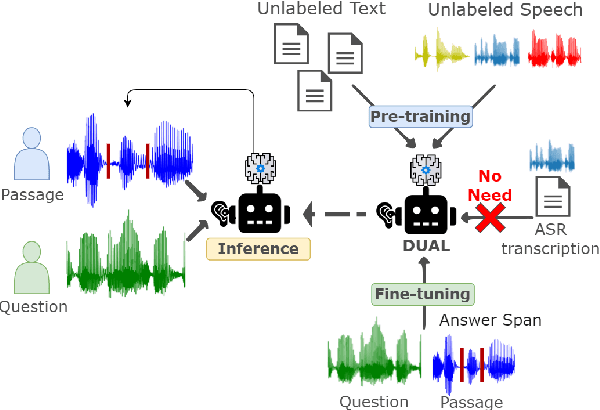
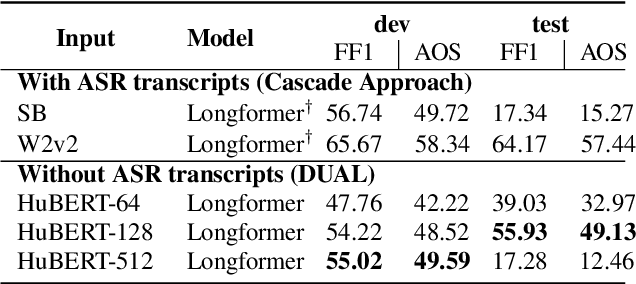
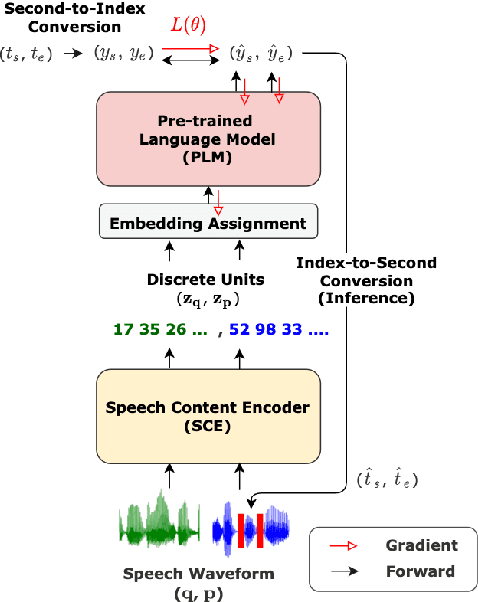

Abstract:Spoken Question Answering (SQA) is to find the answer from a spoken document given a question, which is crucial for personal assistants when replying to the queries from the users. Existing SQA methods all rely on Automatic Speech Recognition (ASR) transcripts. Not only does ASR need to be trained with massive annotated data that are time and cost-prohibitive to collect for low-resourced languages, but more importantly, very often the answers to the questions include name entities or out-of-vocabulary words that cannot be recognized correctly. Also, ASR aims to minimize recognition errors equally over all words, including many function words irrelevant to the SQA task. Therefore, SQA without ASR transcripts (textless) is always highly desired, although known to be very difficult. This work proposes Discrete Spoken Unit Adaptive Learning (DUAL), leveraging unlabeled data for pre-training and fine-tuned by the SQA downstream task. The time intervals of spoken answers can be directly predicted from spoken documents. We also release a new SQA benchmark corpus, NMSQA, for data with more realistic scenarios. We empirically showed that DUAL yields results comparable to those obtained by cascading ASR and text QA model and robust to real-world data. Our code and model will be open-sourced.
SUPERB-SG: Enhanced Speech processing Universal PERformance Benchmark for Semantic and Generative Capabilities
Mar 14, 2022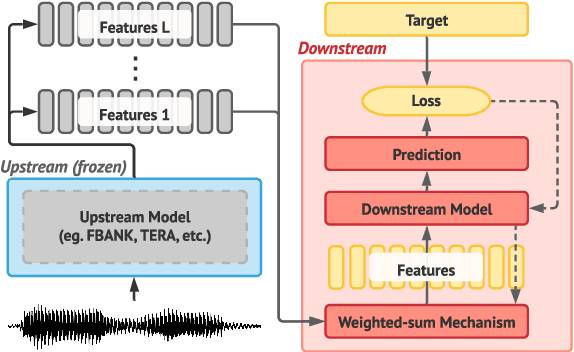
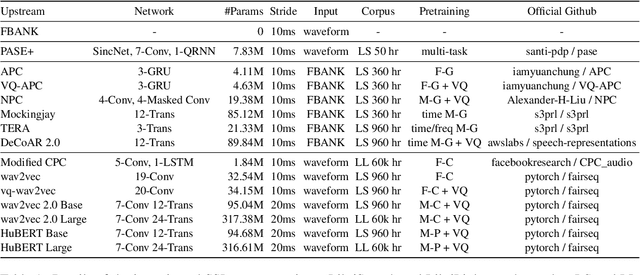
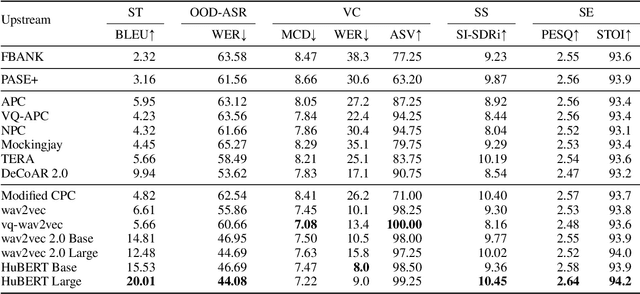
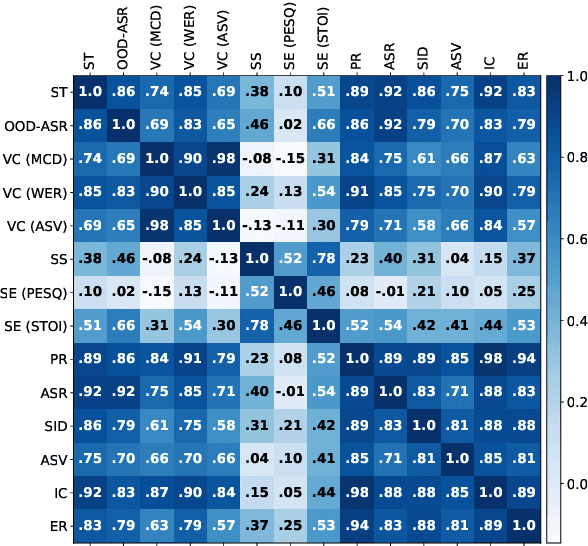
Abstract:Transfer learning has proven to be crucial in advancing the state of speech and natural language processing research in recent years. In speech, a model pre-trained by self-supervised learning transfers remarkably well on multiple tasks. However, the lack of a consistent evaluation methodology is limiting towards a holistic understanding of the efficacy of such models. SUPERB was a step towards introducing a common benchmark to evaluate pre-trained models across various speech tasks. In this paper, we introduce SUPERB-SG, a new benchmark focused on evaluating the semantic and generative capabilities of pre-trained models by increasing task diversity and difficulty over SUPERB. We use a lightweight methodology to test the robustness of representations learned by pre-trained models under shifts in data domain and quality across different types of tasks. It entails freezing pre-trained model parameters, only using simple task-specific trainable heads. The goal is to be inclusive of all researchers, and encourage efficient use of computational resources. We also show that the task diversity of SUPERB-SG coupled with limited task supervision is an effective recipe for evaluating the generalizability of model representation.
Meta-learning for downstream aware and agnostic pretraining
Jun 06, 2021Abstract:Neural network pretraining is gaining attention due to its outstanding performance in natural language processing applications. However, pretraining usually leverages predefined task sequences to learn general linguistic clues. The lack of mechanisms in choosing proper tasks during pretraining makes the learning and knowledge encoding inefficient. We thus propose using meta-learning to select tasks that provide the most informative learning signals in each episode of pretraining. With the proposed method, we aim to achieve better efficiency in computation and memory usage for the pretraining process and resulting networks while maintaining the performance. In this preliminary work, we discuss the algorithm of the method and its two variants, downstream-aware and downstream-agnostic pretraining. Our experiment plan is also summarized, while empirical results will be shared in our future works.
* Extended abstract
SUPERB: Speech processing Universal PERformance Benchmark
May 03, 2021

Abstract:Self-supervised learning (SSL) has proven vital for advancing research in natural language processing (NLP) and computer vision (CV). The paradigm pretrains a shared model on large volumes of unlabeled data and achieves state-of-the-art (SOTA) for various tasks with minimal adaptation. However, the speech processing community lacks a similar setup to systematically explore the paradigm. To bridge this gap, we introduce Speech processing Universal PERformance Benchmark (SUPERB). SUPERB is a leaderboard to benchmark the performance of a shared model across a wide range of speech processing tasks with minimal architecture changes and labeled data. Among multiple usages of the shared model, we especially focus on extracting the representation learned from SSL due to its preferable re-usability. We present a simple framework to solve SUPERB tasks by learning task-specialized lightweight prediction heads on top of the frozen shared model. Our results demonstrate that the framework is promising as SSL representations show competitive generalizability and accessibility across SUPERB tasks. We release SUPERB as a challenge with a leaderboard and a benchmark toolkit to fuel the research in representation learning and general speech processing.
Meta learning to classify intent and slot labels with noisy few shot examples
Nov 30, 2020
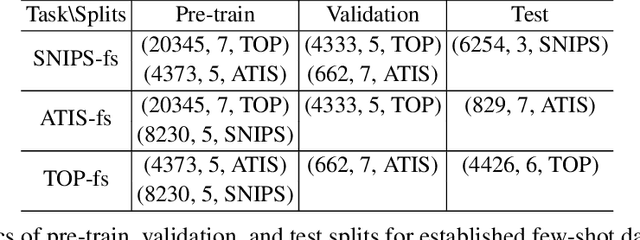
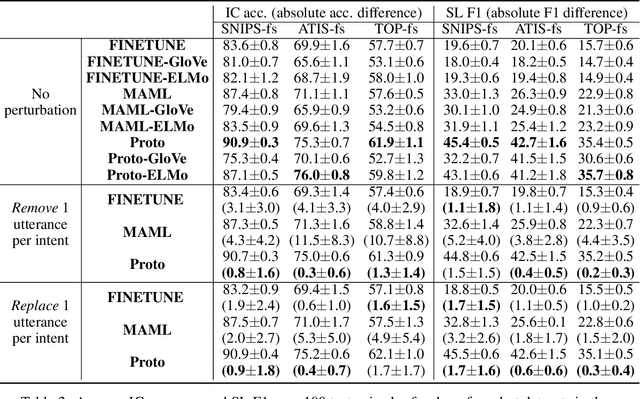
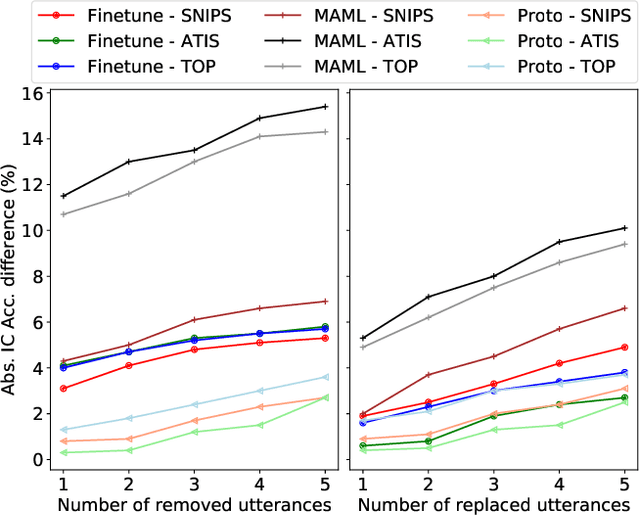
Abstract:Recently deep learning has dominated many machine learning areas, including spoken language understanding (SLU). However, deep learning models are notorious for being data-hungry, and the heavily optimized models are usually sensitive to the quality of the training examples provided and the consistency between training and inference conditions. To improve the performance of SLU models on tasks with noisy and low training resources, we propose a new SLU benchmarking task: few-shot robust SLU, where SLU comprises two core problems, intent classification (IC) and slot labeling (SL). We establish the task by defining few-shot splits on three public IC/SL datasets, ATIS, SNIPS, and TOP, and adding two types of natural noises (adaptation example missing/replacing and modality mismatch) to the splits. We further propose a novel noise-robust few-shot SLU model based on prototypical networks. We show the model consistently outperforms the conventional fine-tuning baseline and another popular meta-learning method, Model-Agnostic Meta-Learning (MAML), in terms of achieving better IC accuracy and SL F1, and yielding smaller performance variation when noises are present.
 Add to Chrome
Add to Chrome Add to Firefox
Add to Firefox Add to Edge
Add to Edge